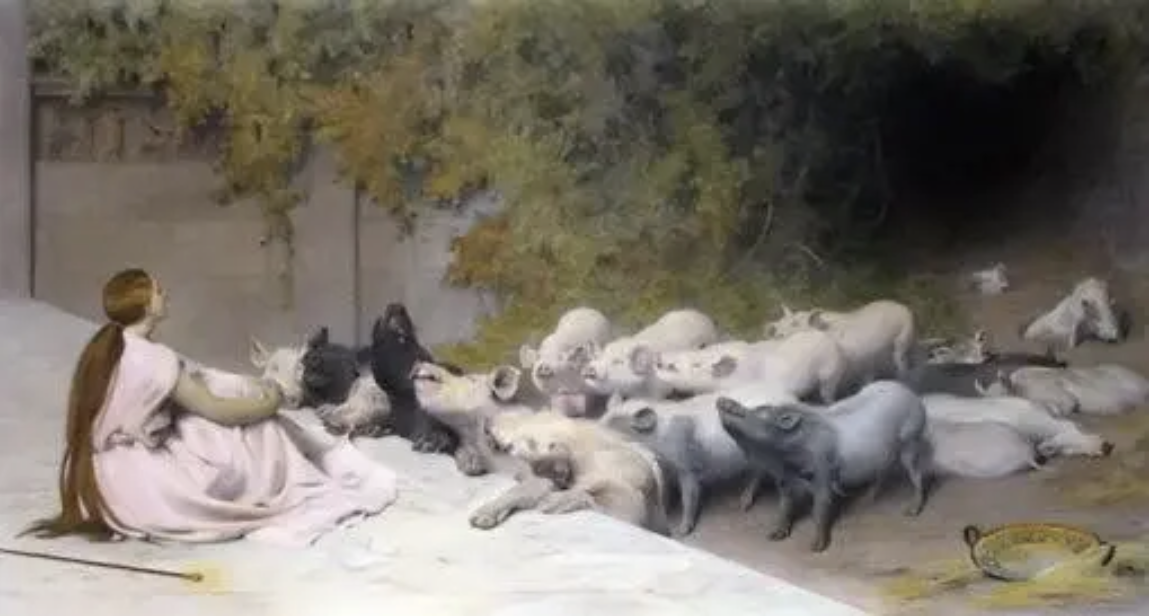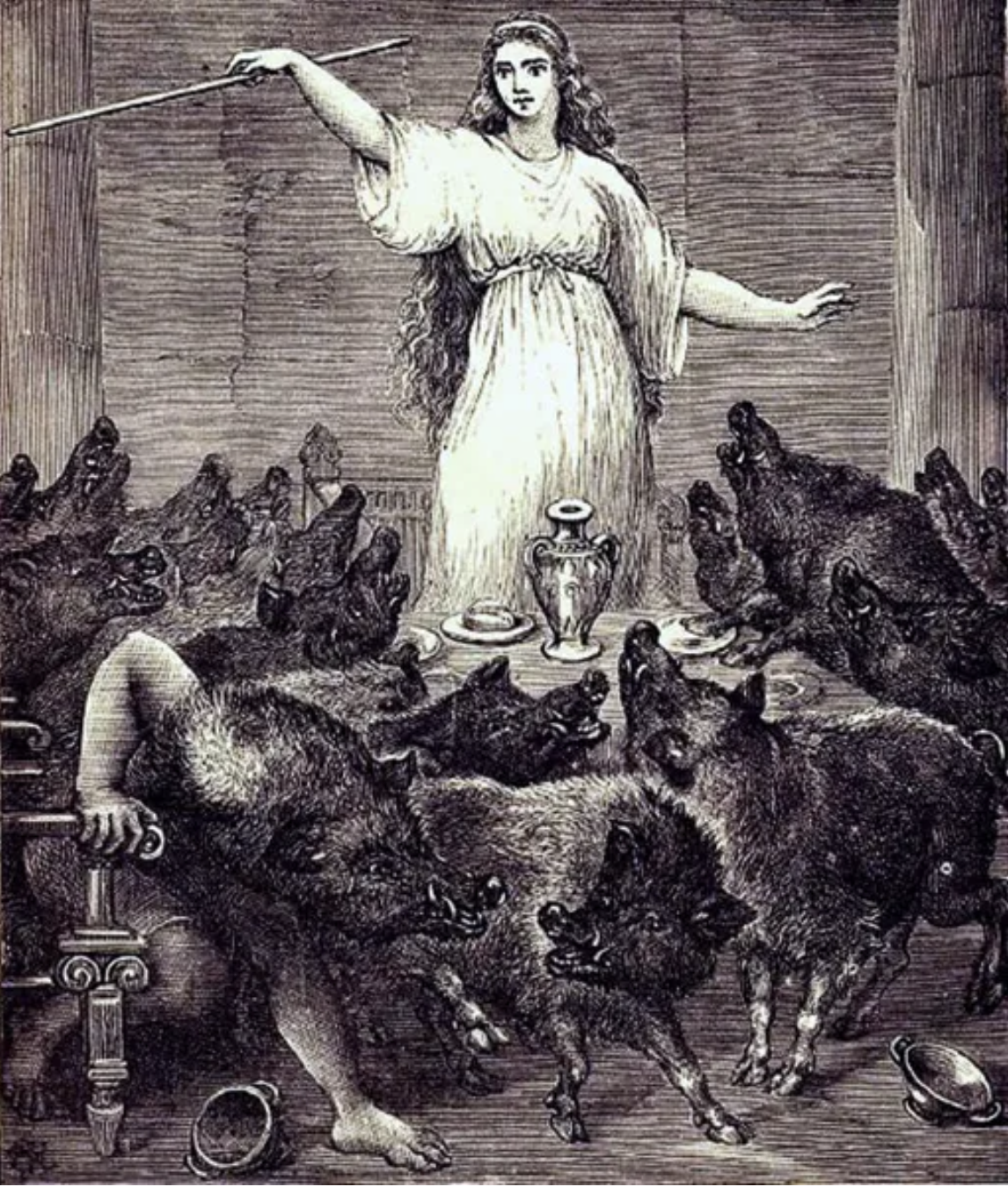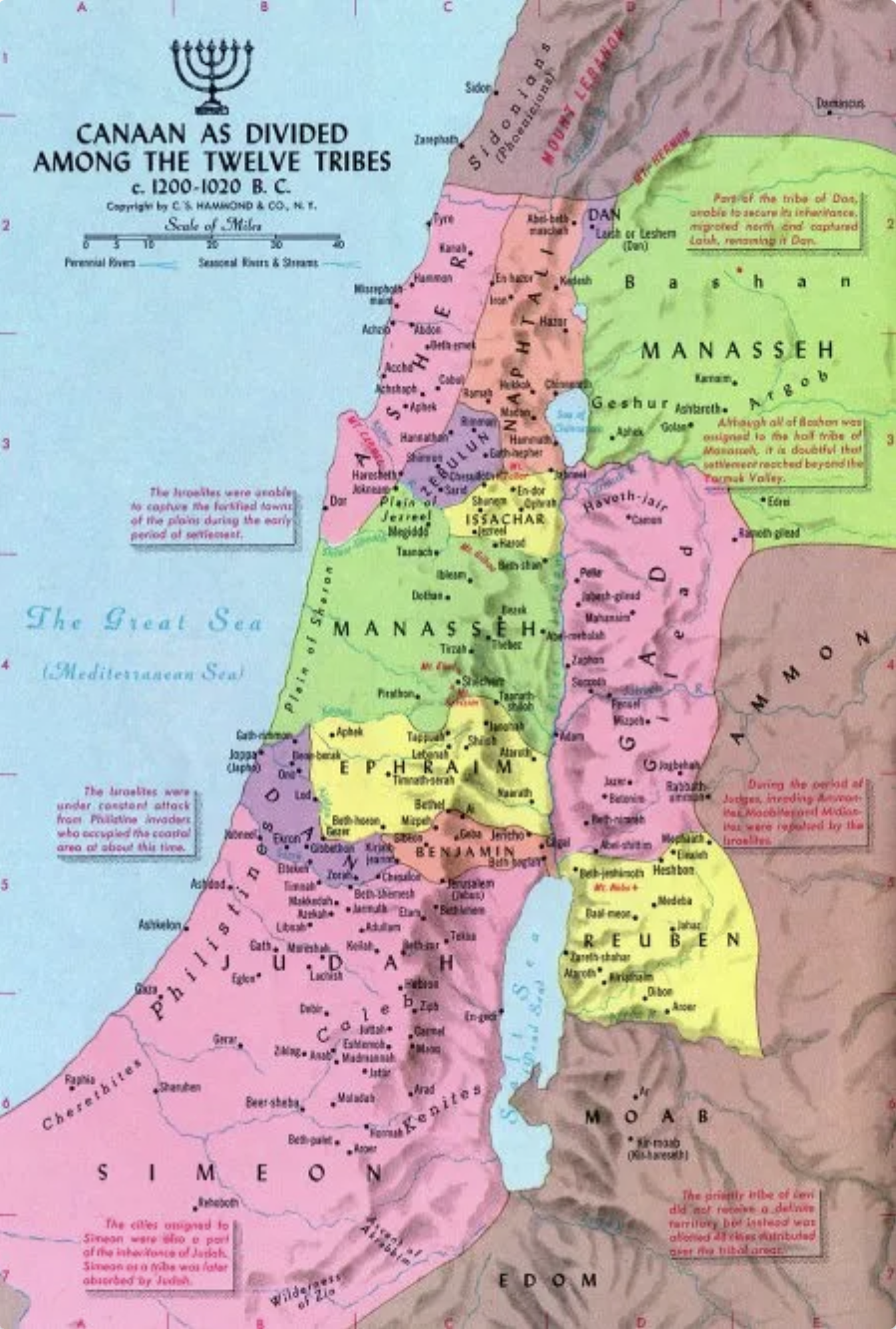
John 20:19-31 (Matins)
Ephesians 4:7-13
Matthew 4:12-17
Hoggish Minds
He came and dwelt in Capernaum, which is by the sea,
in the regions of Zebulon and Naphtali ....
(Mt 4:13)
In the Name of the Father and of the Son and of the Holy Ghost. Amen.
This morning
we find Jesus wandering the Levant exhorting the Lost Sheep of Israel
to return to the family fold.
Everywhere He goes His message is the same:
"Metanoiete!" ....
which is to say,
"Return!
You are headed the wrong way!":
"From that time Jesus began to preach and to say,
'Repent, for the Kingdom of Heaven is at hand.'"
|
"Make a U-turn from hoggish life
and
return to your ancestral lands, which are Eden!"
The Gospel emphasizes
"from that time
He began to preach, "Metanoiete!."
And what is that time?
It begins when Jesus learns that John the Baptist has been imprisoned.
The Man of Eden has been put in chains.
So Jesus takes up His ministry,
which the Forerunner had prepared for Him.
It will be different from John's,
for Jesus is the new life, to which John's cleansing waters had pointed.
Jesus is the Eden, the union with God,
which Paradise has betokened.
The stage is now set.
The royal herald, the Forerunner, has completed his course.
King Jesus
—
His title Kyrios means "king" or "lord" (reserved for YHWH in the LXX)
—
now makes His royal progress from lost tribe to lost tribe.
We have been with Him in some of these royal visitations,
in Judah and in Gad,
for example.
What He finds in these places calls my imagination back to
college,
when I read
The Faerie Queene
by Sir Edmund Spenser,
one of the masterpieces of English literature.

In Book II, Canto XII,
Sir Guyon
(an allegorical figure of Christ),
whose quest is the restoration of Eden,
enters the once splendid Paradise, now ruined.
Like Jesus in Gad,
he encounters once virtuous men hideously transformed,
possessed through the spell of an enchantress.
In Sir Guyon's case,
they have been transfigured into wild pigs.
Yet
as Jesus had healed the Gadarene demoniacs,
a holy palmer with Sir Guyon
regenerates these men back to their former state.
With horror,
they are conscious of the craven animals they had been
and
mindful of
the beastly things they had done.
But one of them,
Sir Grill by name,
rejects the palmer's healing ministrations.
He enjoys his hoggish life.
He is alarmed at these intruders.
So like Jesus Whom the Gadarenes drove back to His boat
and
out of Gad,
Sir Guyon retreats:
Said Guyon, See the mind of beastly man,
That hath so soone forgot the excellence
Of his creation, when he life began,
That now he chooseth, with vile difference,
To be a beast, and lacke intelligence.
To whom the Palmer thus, The donghill kind
Delights in filth and foule incontinence:
Let Grill be Grill, and have his hoggish mind,
But let us hence depart, whilest wether serves and wind.
(Faerie Queene, II, XII, lxxxvii)
|
We know the end of the story in Gad.
Jesus and the Twelve
return to their boat,
departing from this ruined garden,
never to return (at least not in earthly form),
leaving the men of hoggish mind
to
continue feasting on hoggish fare.
Who could doubt
that Spenser had
Jesus' visit to the tribe of Gad
in mind
as he wrote these lines
in Ireland during the 1580s.
In the original,
not a figure of Christ,
but Christ Himself,
encounters men who have been transformed from their former godly selves
into
lowly beasts who feed on hogs until they themselves have become hoggish,
even chained to the dwelling-places of death
until such time that they live there eternally.
The Kingdom of Heaven has drawn near.
They are invited to return to their original state.
But they drive the Lord of Eden back to His boat.
And forever after,
I have recalled the holy palmer's words
when I see all such things as this:
"Let Grill be Grill and have his hoggish mind."

We are so keen from the start to read the Gospels allegorically and tropologically,
that we lose sight of the literal level.
On the surface,
the entire
reason for Jesus' three-year ministry
is to visit the Twelve Tribes of Israel
bringing with Him the twelve kings who are to govern them rightly,
who are to
lead them back into the family fold.
Indeed, the Twelve have been chosen precisely to effect this restoration:
These twelve Jesus sent out and commanded them, saying: "Do not go into the way of the Gentiles,
and do not enter a city of the Samaritans. But go rather to the lost sheep of the house of Israel.
And as you go, preach, saying, 'The Kingdom of Heaven is at hand.'
Heal the sick, cleanse the lepers, raise the dead, cast out demons.'"
(Mt 10:5-8)
|
We have reflected at the Hermitage on the visit to Gad at length.
But we have also seen them in Judah and Benjamin,
where they nearly are stoned and imprisoned.
We have seen them in Asher with its notorious cities, Tyre and Sidon,
and
in Dan,
where the Jordan bubbles up in cool springs at its headwaters,
where Jesus asked,
"Who do you say that I AM."
This morning we read of their arrival to the historic tribal kingdoms
of Naphtali and Zebulon,
associated with the towns of Capernaum and Bethsaida.
Here many powerful acts of God are seen.
In this region,
Jesus has walked on water (Mk 6:45-51),
has fed the 5,000 (Lu 9:12-17),
and
has given a blind man His sight (Mk 8:22-26).
More than forty miracles are seen in Capernaum,
the site of Peter's house,
where Jesus and His Disciples also have called home for a time.
Yet,
the people in these tribal regions do not honor them,
do not receive them.
Jesus' reply to them is that
the works of Almighty God are not magician's tricks
displayed for the entertainment of indifferent onlookers.
"To what shall I liken this generation?"
He asks archly:
"It is like children sitting in the marketplaces and calling to their
companions, and saying:
'We played the flute for you,
And you did not dance;
We mourned to you,
And you did not lament.'
For John came neither eating nor drinking, and they say, 'He has a demon.'"
(Mt 11:16-18)
|
The works of God are not to be taken lightly by anyone:
Then the Pharisees and Sadducees came, and testing Him asked that
He would show them a sign from heaven. He answered and said to them,
"When it is evening you say, 'It will be fair weather, for the sky is red';
and in the morning, 'It will be foul weather today, for the sky is red and
threatening.' Hypocrites! You know how to discern the face of the sky,
but you cannot discern the signs of the times. A wicked and adulterous
generation seeks after a sign, and no sign shall be given to it except
the sign of the prophet Jonah." And He left them and departed.
|
The sign of Jonah is the sign given to those who have refused
God's call,
who have requited God's Holiness with an unholy life and unholy mind.
As He was driven out of Gad,
Jesus takes His leave of Naphtali and Zebulon, as well.
We read His parting words with dread:
Then He began to rebuke the cities in which most of His mighty works
had been done, because they did not repent: "Woe to you, Chorazin
[another town of Naphtali]! Woe to you, Bethsaida! For if the mighty
works which were done in you had been done in Tyre and Sidon, they would
have repented long ago in sackcloth and ashes. But I say to you, it
will be more tolerable for Tyre and Sidon in the day of judgment than
for you. And you, Capernaum, who are exalted to Heaven, will be brought
down to Hades; for if the mighty works which were done in you had been
done in Sodom, it would have remained until this day. But I say to you
that it shall be more tolerable for the land of Sodom in the day of judgment
than for you."
(Mt 11:20-24)
|
☦
Jesus and His Disciples have wandered from one household to another:
the House of Judah,
the House of Reuben,
the House of Gad,
the House of Naphtali,
the House of Zebulon,
and so on.
He has reached out to the people
who are His near relations.
All of this is about family ..... though,
as we can see,
not a happy family.
Family goes to the heart of God's identity as we,
His human creatures,
are to understand Him.
He is our Father (we learned in our earliest prayers).
The Son of the Father is also God.
God is a unity of Three, which mathematically are the basic elements for all other expressions,
the basic atom of Divine and human meaning.
God is about relationship, family relationship.
In a recent trip to collect fish waste for our organic composting operation,
one of the Sisters and I walked past a bumper sticker that read "Jesus Loves You."
Certainly, John the Theologian tells us that "God is love."
But I wonder if we ought understand this, more precisely, as
"God is kin,
God is family"
in the sense of family love.
As St. John says frequently,
we are to understand ourselves as being "God's children."
And he writes,
"But as many as received Him [Jesus] to them gave He the
power to become the sons [and daughters] of God" (Jn 1:12).
The love God offers us is unmistakable.
We are formed in it from our birth.
God to us, from the beginning, is family.
There is no other way to approach Him.
In the Gospels,
we find two refinements:
unhappy family or happy family,
estranged sons and daughters or loving sons and daughters.
On a personal note,
I must confess that from my earliest years I have never understood
the "Jesus loves you" cult.
I have tried to be part of it, to be sure.
I was never able to accept this concept of "Pal Jesus,
my Bud,
my Bro,
who "has my back."
As I have matured, I saw that is was un-Biblical.
Needless to say, the sentence "Jesus loves you" never appears in the Bible.
No figure like this appears anywhere in the New Testament.
And as a Catholic and then Orthodox priest,
I rejected it outright as being heretical.
What has always touched me from my earliest childhood
(and I think I knew this instinctively before anyone told me)
is that I am loved by the God and Father of all.
Yes, I was taught to say, "My Father in Heaven,"
but
it always felt right from the first time I said it.
This loving, providing, understanding Father is One with His Son, Who speaks for Him
and
Who assures us of the Father's care and love.
This is primary in St. John's Gospel.
All of this comes naturally,
without strain,
there is not false note sounded,
for it is deeply familiar,
as familiar as .... family.
Of course,
Orthodox theology teaches that wherever One Person of
the Holy Trinity is Present,
the Fullness of the Holy Trinity is Present.
But,
as I say,
it is our personal concept of God that I ask us to consider today.
Family is God's way.
There is something else here.
This conception that "Jesus is my bud, my bro ...."
You see,
"It's me and Jesus."
The one who says it puts himself first
because it is all about him:
about "his relationship with Jesus,"
about his "being saved"
(and no doubt he tells every one the day and hour he was saved
asking if and when you were saved and the magic moment it happened).
The overall message is here is "I come first."
But that is not the prayer we were taught.
The "Our Father" teaches us from the start that we are in it with many others,
who are also family,
remembering always the Second Great Commandment.
You see,
this is family love.
Like it not,
we're in it together.
Family is God's way.
Family goes to the heart of His Trinitarian identity,
and
it is His manifestation before the Twelve Tribes of Israel in the Sinai Wilderness,
whom He sees as His children.
The Holy Scriptures record the many rocky relationships within this family over
a period of thousands of years.
That is why the Parable of the Prodigal Son
speaks to us so vividly.
In a sense,
the Gospels are about a kind of final estrangement between God
and
His family .... though, you know, with families there can never be
a final separation.
Family is family.
What is our part in this,
I mean those of who are not descended from Jacob-called-Israel?
Our only part can be as adopted children.
You see this has nothing to do with,
"\f2I\f1 am saved!"
.... with its implied demand,
"When was the moment you were saved?!"
No,
our question is different.
It is about taking our place among a very large group, an enormous family.
If we do not become the adopted daughters and sons of God,
then we can have no part in Him.
He tells us this clearly.
Jesus tell us we must become children, to have the heart of a child,
and
to understand that God is our Father.
This is the only way:
to have the heart of a child,
to reverence God as our Father,
to see that Jesus is manifestly our Older Brother,
Who shows us
how to behave,
how to think,
how to feel.
He is the role model in our family.
And that is what we celebrate today on
that other feast associated with January 6,
the Epiphany.
Today we give thanks for our own eternal life and pedigree as children of God,
a birthright.
As we read in our Gospel lesson this morning:
"By the way of the sea, beyond the Jordan, Galilee of the Gentiles:
The people who sat in darkness have seen a great light,
And upon those who sat in the region and shadow of death Light has dawned."
(Mt 4:15-16)
|
In the Name of the Father and the Son and the Holy Spirit.
Amen.


